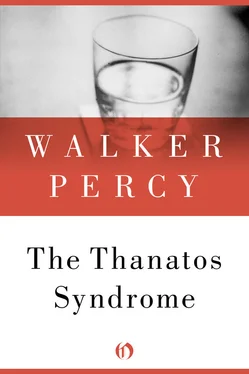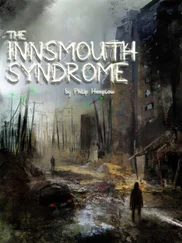“Now you listen here, Cooter,” says the uncle, who, I see with some dismay, is hopping from one foot to the other in a peculiar fashion, coat flapping open, “I was here so don’t tell me what I saw. These folks all crazy as hell. You know what that little lady and the Coach were—”
“You just hold it, Hugh Bob,” says the sheriff, holding out a hand but not bothering to look at the uncle. “You just watch your mouth when you talking about Lurine — Mrs. Cheney. Ever’body knows you were pestering her when she was staying out at Pantherburn with Miss Lucy’s mamma, your sister, before she died.”
The pudding-faced, flat-topped deputy leans over to say something to the sheriff.
“Weapon?” says the sheriff. “What you talking about, weapon? You got a weapon, Hugh Bob?”
The uncle opens his mouth, but before he can say anything, the deputy simply lifts the uncle’s coattails and extracts the Colt Woodsman from his jacket pocket.
The sheriff, again overcome with sorrow, accepts the gun, sniffs the muzzle.
“This weapon has just been fired, Hugh Bob.”
“It sho has.”
“Who at?”
“Him.” The uncle nods at Coach, who appears lost in thought, studying his palms, which are open on his knees. The sheriff walks around him, looking him over. The other side of his head is not bleeding but is encrusted with a maroon clot.
“Coach?” he says, peering down at him. He stands up, hands on hips. “What in the hell did you do to him, Hugh Bob, shoot him in the head?”
“Just his ear,” says the uncle, not displeased.
“What in the hell — check that shotgun, Huval,” he says to the younger, balder deputy.
Huval checks the Purdy. “Two shells, one recently fired.”
“Where else did you shoot him?” asks the sheriff, moving the game table back and stepping past Mrs. Cheney to get a good look at Coach.
“Hi, Cooter,” says Mrs. Cheney, giving him a pat as he passes.
“Did that man shoot you?” he asks Coach.
Coach pooches his lips in and out and says, “Hoo hoo hoo.”
“This sucker has brain damage,” muses the sheriff. “Thanks to you, Hugh.”
Across the table, Mr. Brunette begins to stamp with one foot.
“What in the hell did you do to him, Hugh Bob?”
“I had to shoot him,” says the uncle, beginning to hop again. “He was coming at me and he would have gotten away.”
“What — in — the — hell—” begins the sheriff, turning first to me, then, thinking better of it, beseeches Van Dorn, who is still sitting, rocking to and fro, on the top step.
“Sheriff Sharp,” I say, rising, “I can explain everything. But right now I really think it would be a good idea if you would arrest all these people, examine the evidence, both these photographs and Dr. Lipscomb’s medical evidence of abuse before any more children are harmed, in which case I hold you responsible. In fact, I insist on it.”
The sheriff slowly rounds on me, stepping clear of the table— Mrs. Cheney gives him another pat as he passes — plants feet apart, hand on hips. “You demand of me.” He cups an ear. “Doctor, did I hear you say that you demand of me?”
“I didn’t say demand.” Now he does look straight at me, all the Western cantering-posse geniality suddenly sloughed — we’re back to his old, flat-eyed, bulged-vein sheriff’s anger. He hates my guts! We’re back in the sixties, where we’ve always been, he the true Southerner, I the fake Southern liberal — the worst kind. He could be right.
“Let me just remind you, Doctor, of two little facts, one of which you may be aware of, the other you are evidently not.”
“All right.” Nothing is more menacing than an old-style, soft-voiced Southern sheriff.
“You’re the felon here, Doctor, not them, you heah me? You’re the one I arrested and convicted two years ago of selling drugs. You the one went to jail, not them. Two.” He holds two not fat but big and long fingers in my face. “I have a telex in my office as of last night from the ATFA people to pick you up on the parole violation. You heah me, Doctor?” The cold rage of lawmen is never not present and never less than astounding. I’ve never seen even enraged paranoiacs get as angry as policemen. Slowly he folds his fingers, making a fist with a Masonic ring as big as a brass knuckle. He could easily hit me. Slowly the fist descends until his thumb hooks on to his Texas belt. “So I tell you what let’s me and you do, Doctor. Let’s you and me go on out to my car and go up the road a piece to Angola. Then we’ll see about your old friend Hugh Bob here and take care these other good people — if I can find out what you done to them.”
“Sheriff, I ask you for the last time and in your own best interests to arrest these people and hold them at least for investigation. Otherwise I fear I know what is going to happen. As for the warrant to pick me up, I’ve already been to Angola and am presently out on a pass. If you like, please call Warden Elmo Jenkins in the federal detention unit.”
“If I like — You fear — You mocking me?” Smiling, he comes close. He hates everything I do. He hates my seriousness more than sass, the hatefulness translating into a kind of familiarity. He comes up close as a lover, actually touching me with his stomach, like an enraged coach bumping an umpire — but more erotically. “If I like — I’ll tell you what I like, Doctor. I’d like it if you would get going right through that door.” He reaches for the door.
“Whoa!” says the uncle, not attempting to block the sheriff at the door but craning past him. “Look ahere, Cooter,” says the uncle, hopping from one foot to the other. “Let me tell you—”
The sheriff, aware of a commotion behind him, slowly turns, holding out a staying hand to me.
Mrs. Cheney has meanwhile risen from the couch and, approaching the sheriff, turned her back, lifted her skirt, and now in one quick practiced motion, or rather, several in rapid succession, lifted her skirt, snapped down her panties — teddies? they’re long, lavender, and loose-fitting — and presents to Sheriff Sharp, mooning him in the saucy way sorority girls do in certain film comedies, hands on knees, head cocked friskily around.
She backs into him.
“What?” says Sheriff Sharp, rearing a bit. “Hey!”
Mrs. Cheney reaches behind her and with a sure instinct and sense of direction takes hold of him. Then, finding him clothed, she seizes his hands in hers and places them on her hips, under hers, to assist her movements.
“What?” repeats the sheriff, looking right and left as if to call people to witness, but then thinks better of it, and in a lower voice, speaking to the top of Mrs. Cheney’s head, “Jesus, Lurine,” and in an even lower voice utters (I think): “Later, girl.”
There is a growling above.
Coach and Mr. Brunette are still in their “bachelor” postures of submission — Coach, head bowed, studying his palms, contenting himself with a single stomp of his running shoe; Mr. Brunette, one elbow crooked over his head, laying it over to allow Mrs. Brunette to groom him.
“Would you look at that woman,” whispers the uncle to Vergil, the uncle at first rapt, then hopping and poking an elbow into Vergil’s side.
But Vergil, arms crossed, eyes monitored, permits himself no more than a single, unsurprised shrug. There is no telling what white people—
The two deputies, trapped between amazement and stoicism, both advance and retreat, stretch forth hands to help, pull them back. They cannot bring themselves to look at each other.
Mr. Brunette is exploring Mrs. Brunette’s thigh with an un-lewd finger, simply poking up the fabric of her skirt along her stocking as a child might look under a curtain in hide-and-seek, Mrs. Brunette simply allowing it through a lack of attention. The skirt reaches her waist and Mr. Brunette takes an interest in what is indeed a complex business — not panty hose, as one might expect, but stockings suspended by garters from a girdle of scalloped black lace at her waist — garter belt? — this rigging of straps and lace overlaying a bikini, that is to say, a single transparent tape and a small snug triangle of black lace.
Читать дальше












